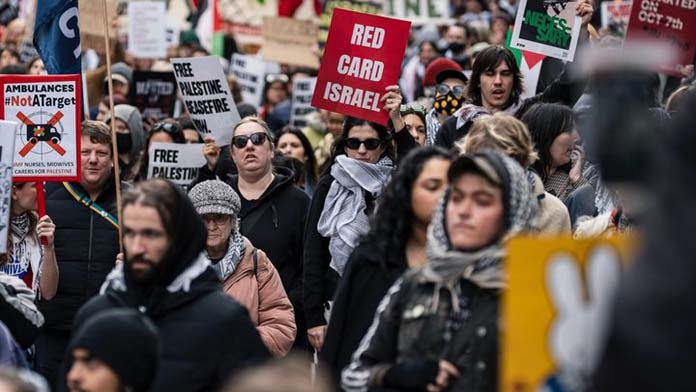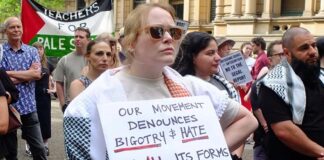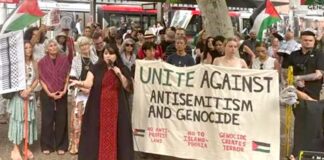Israel’s escalating aggression is again risking a war across the Middle East.
Iran was expected to retaliate as Solidarity went to press, after Israel assassinated Hamas’s political leader Ismail Haniyeh on Iranian soil. The strike was a humiliation for Iran, which had guaranteed the Hamas leader’s safety.
It followed Israel’s assassination of senior Hezbollah commander Fuad Shukr in Beirut, after it blamed Hezbollah for a rocket attack in the occupied Golan Heights that killed 12 Druze children and young adults. Hezbollah denied responsibility for the strike, blaming an Israeli interceptor missile.
All-out war between Hezbollah and Israel is possible. In June the Israeli Defense Forces (IDF) said it had approved a plan for a ground assault into Lebanon, with both sides trading missile strikes across the border since October.
Israel still refuses to accept ceasefire proposals in Gaza, bombing and massacring Palestinians every day in schools, hospital courtyards and refugee camps.
It continues its appalling war crimes targeting civilians. Lack of sanitation, water and food are breeding epidemics. Terrifyingly, polio has appeared. Starvation is spreading with Israel blocking aid deliveries through the Rafah crossing for more than two months.
At the end of July Israeli soldiers deliberately blew up the main drinking water reservoir in Rafah, as Palestinians face a severe water shortage.
All this is facilitated by the West. The visit of the architect of genocide, Israeli Prime Minister Benjamin Netanyahu, to the epicentre of global power in the US Congress last month was sickening. He received sycophantic handshakes and dozens of standing ovations as he lied to justify his war crimes.
But worldwide outrage at Israel is building. The new ruling from the International Court of Justice (ICJ) on Israel’s actions in the occupied territories delivered another damning blow.
It declared the occupation of Gaza, the West Bank and East Jerusalem illegal, calling for it to end. And it said Israel was breaching international laws on racial discrimination and Apartheid through its “near-complete separation” of Palestinians from Israeli settlers.
It also strengthened the case for sanctions against Israel, saying that all states, including Australia, have an obligation to end any trade with Israel that entrenches its occupation.
The Albanese government continues to give Israel political cover and support for its genocide.
In response to the ICJ ruling it mouthed opposition to Israel expanding settlements in the Occupied Territories but said nothing about ending its Apartheid policies and the occupation as a whole.
Albanese continues to allow the export of parts for F-35 fighter jets that Israel is using to bomb Gaza, and the use of the Pine Gap spy base to send intelligence.
Further evidence of Australian military exports to Israel has surfaced, unearthed by Greens Senator David Shoebridge, in photos of the Sydney-manufactured DroneGun being used by the IDF.
Build the pressure
The pressure on the Albanese government is producing small shifts. For nine months it has imposed appalling restrictions on refugees from Gaza getting to Australia.
About 65 per cent of the 7000 Palestinians who have applied to come to Australia have been rejected, with many told the government did not want them to claim asylum here.
Now arrivals from Gaza will given a new humanitarian visa, after being forced to survive on tourist visas without work rights.
But the government still refuses to condemn Israel’s breaches of international law or to impose sanctions to put real pressure on it to end the killing in Gaza.
After nine months of horror, and weekly rallies, civil disobedience actions and other protests, some feel that all we can do is keep expressing our outrage.
But the movement needs to keep reaching out, responding to developments and engaging wider layers of people in discussion. Systematic organising within union branches and conferences is one important way to win over more people and spread the arguments for Palestine—as the success in the Victorian teachers’ union shows.
Student general meetings at universities are another way to engage more students and deepen the political understanding about Palestine—as well as about the ties with Israel on campuses.
Support for Palestine is still spreading. As thousands rallied for Gaza outside last month’s NSW Labor conference, the conference itself passed a motion calling on Albanese to recognise Palestine as a state “as a priority”—the very issue over which Senator Fatima Payman crossed the floor to vote against the party.
Albanese was embarrassed during his speech as several attendees held up Palestinian flags and signs. This shows the potential to draw unionists and Labor Party supporters into the movement for Palestine.
More union backing and broader support in the working class and across society is needed to build the kind of action that can force Albanese to end his backing for Israel and the US.






